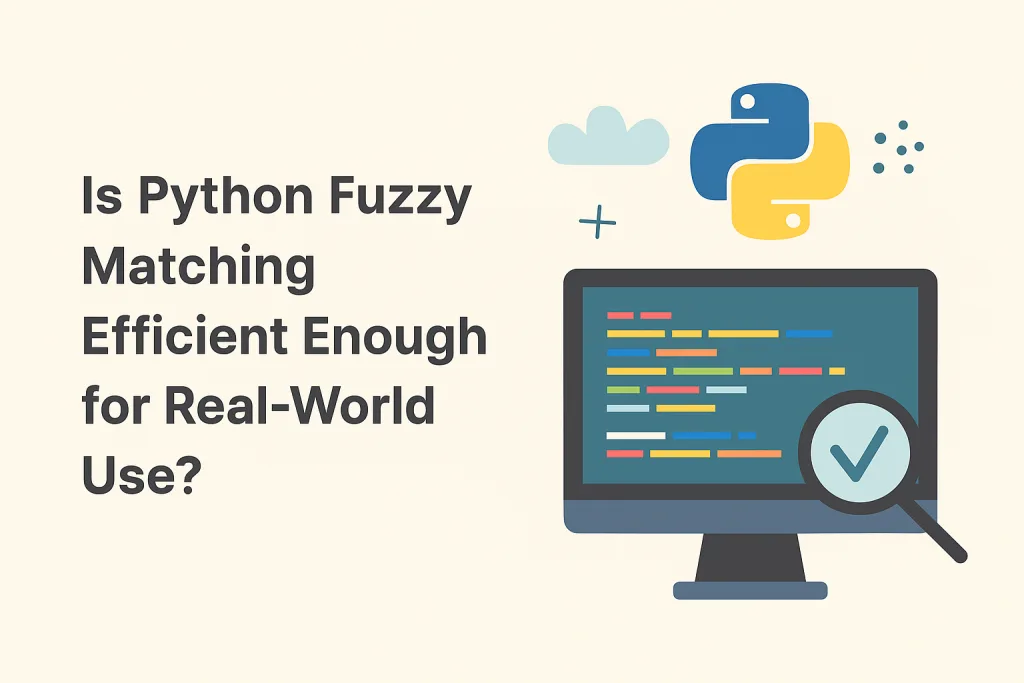Beyond FuzzyWuzzy:
A Better Way to Match
and Clean Data

The Hidden Pain of String Matching
On the surface, matching strings looks simple. You take two names, run a string similarity check, and get a score that tells you if they’re the same. For that reason, many teams start with open-source Python libraries like FuzzyWuzzy or RapidFuzz. They’re easy to install, quick to test, and can produce results in seconds for small datasets.
But the reality is very different when you move from a small proof of concept to millions of records across multiple data sources. What looked like a simple solution quickly becomes a bottleneck. Businesses end up with inefficient processes, inconsistent results, and databases that remain cluttered with duplicates.
This is where Match Data Pro (MDP) comes in. It was built to solve these exact problems: scale, accuracy, grouping, cleansing, and merging. Let’s break down why libraries like FuzzyWuzzy and RapidFuzz fall short and why MDP is the better path forward.
The Problem with Python String Matching Libraries
1. Resource Intensive and Inefficient
Fuzzy string matching in Python isn’t optimized for scale. Both FuzzyWuzzy and RapidFuzz compare strings pair by pair. That might work for 10,000 rows — but once you move into millions of records, the comparisons explode exponentially.
Example:
Imagine a customer database with 5 million records. A pairwise string comparison means potentially trillions of comparisons. Even if optimized, Python’s single-threaded approach can’t keep up. Memory spikes into hundreds of gigabytes, CPU cores run at capacity, and processing that should take minutes can stretch into hours or days.
For businesses that rely on timely insights — like fraud detection, marketing segmentation, or compliance reporting — that’s a deal breaker.
2. No Profiling or Data Quality Insights
One of the biggest weaknesses of Python string similarity libraries is that they assume your data is already clean. But anyone who has worked with real-world data knows that’s never the case.
Extra spaces before or after a name.
Punctuation differences (“Inc” vs “Inc.”).
Common abbreviations (“St” vs “Street”).
Typos and inconsistent capitalization.
Libraries like FuzzyWuzzy can’t detect these issues, let alone fix them. The result is missed matches that should have been obvious.
With Match Data Pro: AI profiling happens before matching. MDP automatically detects patterns, anomalies, and inconsistencies. AI Cleansing tools then let you standardize the data, remove placeholders, and fix errors — ensuring matches are based on truly comparable records.
3. Limited and Rigid Scoring
When you use FuzzyWuzzy or RapidFuzz, you get a single score. For example, two records might match at 87% similarity. But what does that mean? Is 87% good enough to merge? Should you set the cutoff at 85% or 90%?
The problem is that there’s no flexibility. Real-world matching often requires combining multiple criteria, not just one fuzzy score.
With Match Data Pro: you can create scoring definitions that combine multiple criteria. For example:
Company name (fuzzy, 70% weight)
Zip code (exact, 20% weight)
Contact email (fuzzy, 10% weight)
This flexible scoring gives you control and precision. Instead of being locked into one arbitrary score, you can tune the process to your business rules.
4. No Grouping Options
Python string similarity libraries compare records in pairs — and that’s it. They don’t group records into clusters of duplicates.
This leads to the “all-to-some” problem:
“IBM Corp” matches “IBM Corporation”.
“IBM Corporation” matches “IBM, Inc.”.
But “IBM Corp” and “IBM, Inc.” never get grouped together.
The result is fragmented duplicates scattered across your dataset.
With Match Data Pro: grouping is built in. You can choose all-to-some grouping (looser) or all-to-all grouping (stricter), depending on the use case. That way, when you’re cleaning a vendor list or deduplicating customer data, you end up with reliable, complete groups where every member matches every other.
5. No Merge or Export Workflow
Even if Python libraries manage to identify matches, the story ends there. There’s no built-in way to merge matched groups, overwrite outdated fields, or export a clean dataset. Businesses are left writing custom scripts that become hard to maintain and break at scale.
With Match Data Pro: merging and exporting are part of the workflow. After matches are created, you can:
Review groups.
Check scores.
Overwrite or merge records.
Export a clean master dataset directly into your CRM, ERP, or data warehouse.
This turns matching into a full data quality management process, not just an isolated technical exercise.
Real-World Example: Vendor Matching at Scale
Let’s say your company has 2 million vendor records pulled from finance, procurement, and CRM systems.
Using FuzzyWuzzy or RapidFuzz:
Memory usage spikes into terabytes.
Processing takes days.
Matches are inconsistent because of formatting differences (“Acme Inc.” vs “Acme Incorporated”).
Third-party variations (“Acme, Inc.”) may get left out.
The final dataset is full of duplicates, forcing manual review.
With Match Data Pro:
AI Data Profiling spots inconsistencies like punctuation, abbreviations, and spacing.
AI Cleansing rules fix them automatically.
Fuzzy matching definitions use weighted scoring across multiple fields.
Grouping ensures complete clusters (all-to-all).
Merging produces one accurate master vendor record.
AI Match Results Validation ensures each group is accurate by confirming matches with confidence.
The difference is night and day: one approach leaves you buried in duplicates and wasted compute; the other delivers business-ready data you can trust.
Why Match Data Pro Is a True Business Solution
Python string matching libraries were never designed for enterprise use. They’re developer tools for quick comparisons — not platforms for large-scale data quality.
Match Data Pro, on the other hand, is built for businesses that need:
Scale: Handle millions of records without crippling resources.
Accuracy: Weighted, flexible fuzzy matching definitions.
Cleansing: Fix data before it enters the match.
Grouping: Cluster records into complete sets, not isolated pairs.
Merging: Overwrite, consolidate, and export business-ready datasets.
Instead of spending months coding fragile scripts, you get a platform purpose-built for data matching, deduplication, and quality management.
Conclusion: Move Beyond Python Scripts
Libraries like FuzzyWuzzy and RapidFuzz have their place. They’re great for developers experimenting with string similarity on small datasets. But when your business runs on millions of records across multiple systems, they fall apart.
The inefficiency, lack of profiling, rigid scoring, missing grouping, and absence of merge workflows make them unsuitable for serious data quality projects.
Match Data Pro is the solution. It combines profiling, cleansing, fuzzy matching, grouping, scoring, and merging into one streamlined platform. The result is simple: cleaner data, faster insights, and less wasted time and resources.

Are you ready to get started? Register Here!
